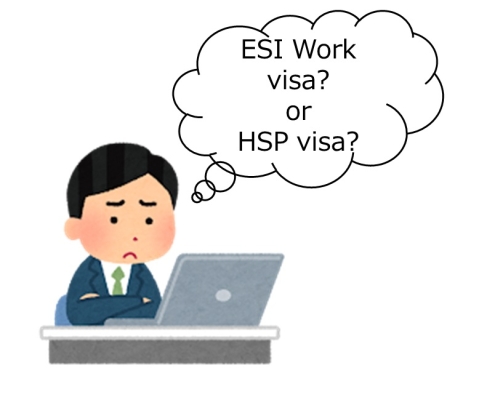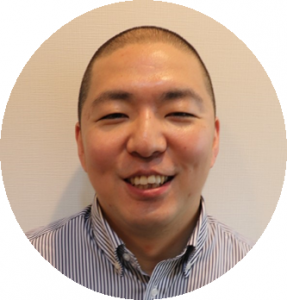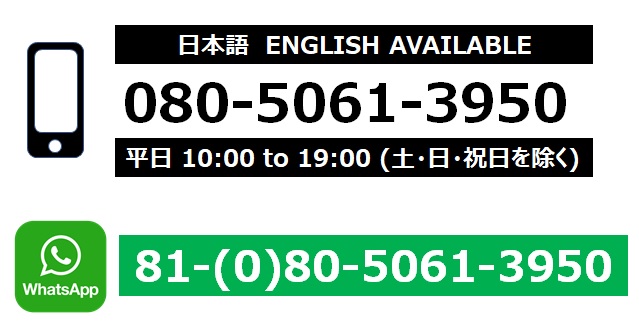When you apply for working visa to enter Japan, Which Visa Should You Apply, “Engineer/ Specialist in Humanities / International Services” or “Highly Skilled Professional”?
April 4 2025

目次
- 1 What Is the “Engineer / Specialist in Humanities / International Services” Visa?
- 2 What Is the “Highly Skilled Professional” Visa?
- 3 Benefits of the “Highly Skilled Professional” Status
- 4 Downsides of the “Highly Skilled Professional” Status
- 5 Do You Need the Highly Skilled Professional Visa to Apply for Permanent Resident Visa with the Point System?
- 6 Should You Get the COE (Certificate of Eligibility) with the “Engineer / Specialist in Humanities / International Services” or “Highly Skilled Professional” Status?
- 7 Tips for the Initial Visa Application
- 8 Free Consultation
- 9 Consultation with a Fee
- 10 Fees for Visa Support
- 11 Related Articles
What Is the “Engineer / Specialist in Humanities / International Services” Visa?
The “Engineer / Specialist in Humanities / International Services” visa is the most common work visa for office workers. You can apply for this work visa on the premise that you work under the contract with the company that has an office in Japan.
There are various requirements for this visa, but in short, it targets office workers who utilize professional knowledge acquired at college or other institutions.
As of 2025, it takes about one to four months from application to approval. Based on the applicant’s career and the company they will work for, the Immigration Bureau will determine the period of stay, selecting from one year, three years, or five years.

What Is the “Highly Skilled Professional” Visa?
The “Highly Skilled Professional” (HSP) visa started in 2015 to promote the recruitment of foreign nationals who have advanced professional skills and contribute to the development of academic research and economy in Japan.
Its point system evaluates the applicant’s education, employment history, annual income, and other items. The applicant who earns 70 points or higher will be granted this visa.
A sample of HSP Point Calculation Sheet
The HSP visa has categories (i) and (ii). The category (i) is further divided into (a) researchers, (b) business people, and (c) business managers.
HSP (i)(a) for researchers etc
HSP (i)(b) for business people etc
HSP (i)(c) for business managers etc
The HSP (ii) visa is for those who have worked for 3 years or more with the category (i) visa.
HSP (ii)
Although the guideline states that the application for the HSP visa will be given priority for processing, its process still takes from one to three months, about the same period with the “Engineer / Specialist in Humanities / International Services” visa as of 2025.
Once your application for the HSP status is approved, you will automatically be granted the stay for five years.
Benefits of the “Highly Skilled Professional” Status
The “Engineer / Specialist in Humanities / International Services” status has varying periods of stay (one year, three years, and five years) based on the review by the Immigration Bureau. On the other hand, the HSP status will grant you five years of stay no matter what. This is the first difference.
In addition, if your application meets some conditions, you can bring your parents with you to take care of your child under seven years old. The parents will come to Japan with the Designated Activities No. 34 status.
When your application for the HSP status is granted, you will be provided with the point chart that shows if your total score reached 80 or not. This is another benefit.
A sample of HSP point notification
The point chart indicates you when you can apply for permanent residency. If your points reach 70, but not 80, you may be able to apply for permanent residency in three years. If you score 80 points or higher, you may be able to apply for permanent residency in a year.
There are several other benefits for the HSP status, but this article will omit the details to avoid getting lengthy. For further information about the benefits, please visit this website by the Ministry of Justice.
Downsides of the “Highly Skilled Professional” Status
Unlike the “Engineer / Specialist in Humanities / International Services” status, the HSP visa is tethered to the organization you belong to.
Thus, if you change your jobs, you need to apply for the change of status. This is one drawback. For example, if you acquired the HSP status when working at Company A and then transferred to Company B, you need to re-apply for the HSP status associated with Company B.
Furthermore, those with the HSP status could have a side job, but you need to be cautious.
Even if the side job falls within the range of the “Highly Skilled Professional” status, you may need to acquire the permission for the activities other than those approved in the original status.
Do You Need the Highly Skilled Professional Visa to Apply for Permanent Resident Visa with the Point System?
We often hear from clients who want to apply for the HSP visa so that they can apply for permanent resident visa with its point system.
There are two ways for you to apply for permanent resident visa with the HSP’s point system.
The first case is when the person with the HSP status applies for permanent resident visa. As mentioned above, if you keep the points at 70 or above for three years, or keep the points at 80 or above for one year, you may apply for permanent resident visa according to the point system. (You need to meet other requirements too)
Even if you do not have the HSP status and are in Japan with the “Engineer / Specialist in Humanities / International Services,” “Professor,” or “Researcher” status, you could apply for permanent resident visa as long as you can calculate the points on your own and provide the proof.
Like the first case, you may apply for permanent resident visa if you keep the score 70 points and above for three years or 80 points and above for one year. (you need to meet other requirements too)
Should You Get the COE (Certificate of Eligibility) with the “Engineer / Specialist in Humanities / International Services” or “Highly Skilled Professional” Status?
W\e have looked over the benefits and downsides of the HSP status, but at the end of the day you need to consult the company that made you a job offer to decide which visa to apply for.
The application for the HSP visa requires more documents than the “Engineer / Specialist in Humanities / International Services” visa. Therefore, some companies do not even let you apply for the former.
In this case, you can apply for the change of status from the “Engineer / Specialist in Humanities / International Services” to the HSP status after you arrive in Japan.
Tips for the Initial Visa Application
If you are reading this article and considering permanent resident visa in the future, there are a few tips for your first visa application.
The application form has a section for your employment history in the mother country. Please make sure you fill this section accurately with no omissions. If you can, we also recommend that you acquire the document that proves the employment history before you come to Japan.
The company that supports your visa focuses on the approval of your status to stay. So, they do not explain every single detail of the application form. However, your application will be recorded and stored in the Immigration Bureau for years.
After you arrive in Japan and apply for permanent resident visa with the point calculating system for the HSP, your employment history will be reviewed. If you have different employment records between the applications for permanent resident visa and the past applications, the Immigration Bureau cannot determine which is accurate and reviews them carefully. In some cases, your career record may even raise suspicion.
If you are considering permanent resident visa based on the points calculated with the HSP status, you need to be mindful of the application when you arrive in Japan. For any questions or concerns, please feel free to contact us.

Free Consultation
Please contact our office first. General questions can be answered by email or on Zoom (up to 30 minutes) free of charge.
You can use the following form for free consultation.
Consultation with a Fee
Individual and specific questions can be addressed in person or on Zoom for JPY 11,000 per hour.
You can use the following form for consultation with a fee.
Fees for Visa Support






























